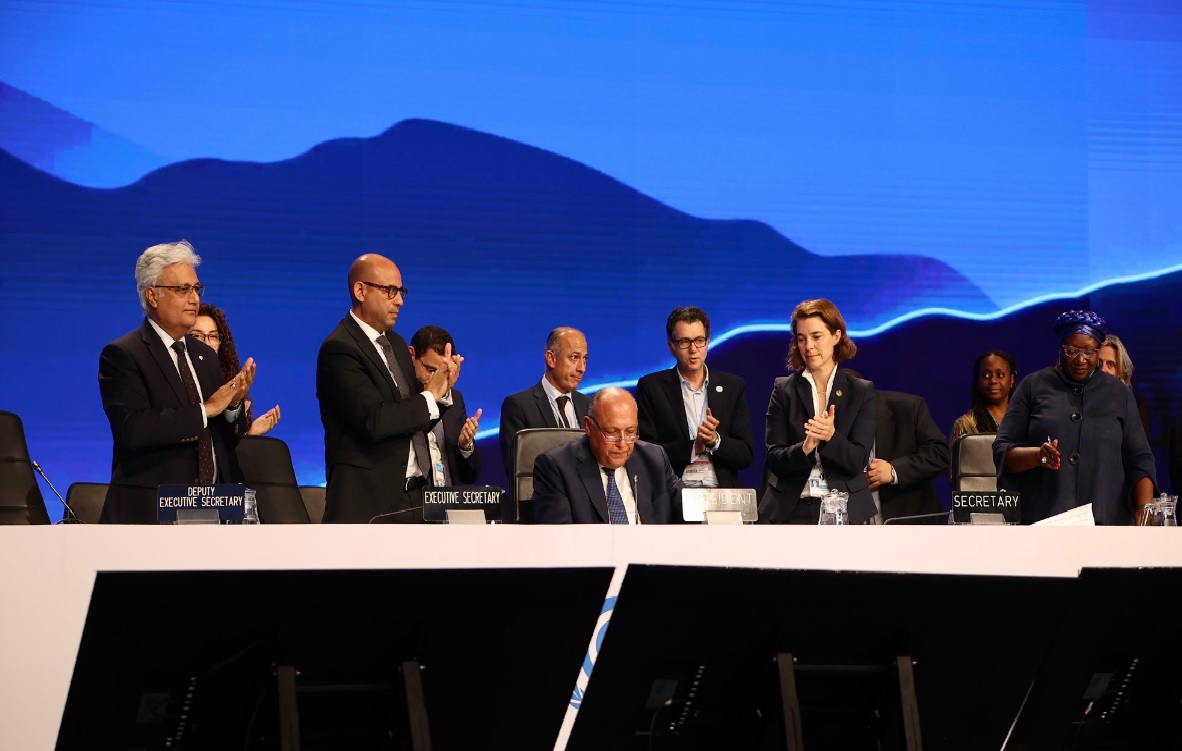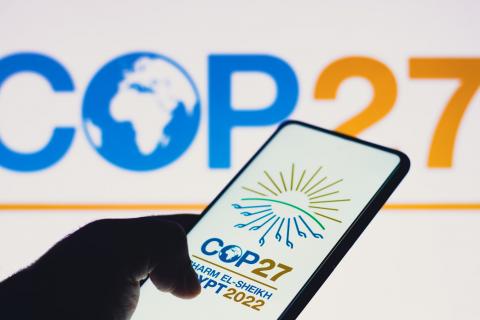Reactions to the loss and damage fund and other agreements reached at COP27
After two long weeks of negotiations and outside the official deadline, COP27 has reached an agreement to create a loss and damage fund to help the most vulnerable countries face the impacts of the climate crisis. However, other issues such as greater ambition in mitigation strategies to avoid exceeding 1.5ºC of warming and less dependence on fossil fuels have not achieved the commitment of all parties.

Vanesa Castán - COP27 EN
Vanesa Castán Broto
Professor of Urban Climate Change at the University of Sheffield
COP27, for the time being, brings good news. The creation of a loss and damage fund is great news, especially after year after year this necessary demand was denied by developed countries. COP27 was the first conference where the loss and damage fund was put on the negotiating agenda and immediately adopted in an atmosphere of political consensus. The question now is one of practicality and implementation: financial means to match political commitments (given that, so far, climate finance has left much to be desired).
On the other hand, agreements on energy transition and moving away from fossil fuels seem out of reach at COP27. Now more than ever we need to stick to the goal of limiting global temperature rise to 1.5°C. Every fraction of an increase implies higher costs. Every fraction of an increase means higher costs, greater damage, and more deaths.
Carolina Gabarró - COP27
Carolina Gabarró
Researcher at the Department of Physical and Technological Oceanography of the Institute of Marine Sciences (ICM-CSIC).
It is very discouraging for me to see the failure to curb the use of fossil fuels (gas and oil), which are the main causes of CO2 emissions. The temperature in the Arctic has more than doubled the global temperature, causing the ice to melt rapidly, which has many ecological and climatic consequences. We are not aware that these changes in the Arctic affect us at all latitudes, not just there: sea level rises, heat waves, fires, changes in climate, etc. Crossing the 1.5°C threshold is very dangerous. There are several points of no return that we are about to cross.
It is sad to see how we are not able to join forces and plan 20-30 years ahead, because we are all going to suffer the consequences. Those who have to change most radically are the countries that have emitted the most in recent decades. In my opinion, we have to decrease as a society, reduce energy consumption and radically reduce CO2 emissions. Because what happens in the Arctic does not stay in the Arctic.
Ernesto Rodríguez Camino - COP27 EN
Ernesto Rodríguez Camino
Senior State Meteorologist and president of Spanish Meteorological Association
Among other declarations and agreements, COP27 finally established a fund to respond to the losses and damages associated with the adverse effects of climate change in developing countries that are particularly vulnerable, although, unfortunately, the development and regulation of this agreement has been postponed to the next COP. Although this point in the final text had raised many expectations, its final formulation has at least made it possible to establish a starting point to give content and form in successive negotiations to compensation for the countries most affected by the effects of climate change.
It is important to stress that science plays an essential role in the whole process of the negotiations in the United Nations Framework Convention on Climate Change, as has been recognised in the successive texts approved at successive COPs. In particular, the text adopted at this COP explicitly mentions the results of the recent reports of Working Groups II (impacts, adaptation and vulnerability) and III (mitigation) of the IPCC's Sixth Assessment Report, which constitute the common basis on which the negotiations are based.
In particular, the scientific community has made substantial progress in recent years in the science of attributing events to climate change, making it possible to differentiate, even in real time, when a weather or climate event can be attributed to natural variability or climate change. When the standard for financial compensation associated with climate change loss and damage is developed, these attribution studies will play a key role.
Fernando Valladares - COP27 EN
Fernando Valladares
PhD in Biology, CSIC researcher and associate professor at the Universidad Rey Juan Carlos de Madrid
The loss and damage fund represents a very clear example of the failure and hypocrisy that climate summits increasingly represent. COP27 wants to be happy for having achieved a pyrrhic, insufficient and as yet unrealised breakthrough on financial mechanisms to assist the most vulnerable countries and to help with damages and losses caused by climate change. This in fact only points with tremendous starkness to the inability of COP27 to address the source of the climate change problem, which is none other than fossil fuels, which continue to rely on unaddressed and unchallenged state subsidies, which continue to be lobbied by 636 oil groups and more companies who have an interest in business as usual for fossil fuels.
The focus on symptoms reflects the global inability to face the terrible reality that we are 80% dependent on fossil fuels to produce our energy. The big countries have not stepped up, the European Union has made very inadequate proposals, and to focus precisely on the damage and loss, when we should be focusing on stopping further damage and loss, reflects the degree of incompetence of those gathered, the degree of political cowardice, the degree of lobbying, and reflects once again the huge gap between climate summits and the urgency of tackling climate change. With each passing day the gap between theory and practice grows wider, some countries suffer more than others, but, in the end, we are all suffering.
María José Sanz - COP27 EN
María José Sanz
Scientific Director of the BC3 Basque Centre for Climate Change
The summit took more than two days to reach agreements that finally provide for the creation of a fund for the most vulnerable countries to cope with the losses and damages caused by the climate crisis. The modalities will have to be worked out over the next year, which is a very common procedure, and attention will have to be paid to this process. This was a summit where loss and damage and adaptation was a critical issue, and the creation of this fund represents a breakthrough. Progress on the work programme on the global adaptation goal to be concluded at COP28 has also been acknowledged.
Despite this good news and the recognition of the importance of adaptation as inevitable and necessary, the fact is that the expected incremental progress on the Glasgow mitigation progress has not been made, although the 1.5ºC target is maintained. Clear references are made to the importance of renewable energies, but language on moving away from fossil fuels has not been agreed due to the reluctance of some producer countries.
Carlos de Miguel - COP27
Carlos de Miguel Perales
Environmental Lawyer and Lecturer of Civil and Environmental Law at ICADE Law School (Comillas Pontifical University)
As is often the case in the international arena, and COP meetings are no exception, one can always say that more could have been done and that progress is very slow. But look on the bright side: progress continues to be made. Proof of this is the agreement on issues related to financing. We are talking mainly about the loss and damage fund associated with the adverse effects of climate change, and that is fine, but this is only a partial aspect of financing and probably not the most important one, because it focuses on the consequences of climate change and not on its causes. There are other issues in the field of financing that have also been addressed at COP27, such as (i) highlighting the role (and responsibility) of developed countries (not only financially, but also in terms of technology and capacity building), (ii) where this financing should be directed (renewable energies, mitigation, adaptation), and (iii) the necessary transformation of the public and private financial system. These agreements may be less concrete than the one on the loss and damage fund, but they should nevertheless be highlighted.
There are other positive aspects to highlight: the objective of not exceeding a temperature increase of 1.5 ºC is maintained; it is resolved to implement an ambitious, fair, equitable and inclusive transition towards low-emission, climate-resilient development; and the importance of certain groups, such as indigenous peoples, local communities, cities and civil society, including women, young people and children, is highlighted.
In conclusion: progress continues to be made in the fight against climate change, but ambition must remain high. It is up to states to implement actions in that fight, but society as a whole also has a role to play, as recent cases of climate litigation around the world show.
He declares that he has no conflict of interest and that he is in charge of the Technical-Legal Secretariat of the Spanish Green Growth Group.
Lluís Brotons - COP27
Lluís Brotons
CSIC researcher at CREAF and co-coordinator of the Laboratory for Biodiversity and Landscape Ecology
The agreement is a pretty clear failure, in my view. There is a step forward in the recognition of something important, the injustice that climate change generates and the importance of compensating that injustice with the Loss and damage fund, but, for the moment, it is a very empty fund. On mitigation, the steps forward have been rather backwards because time is running out.
From a more general point of view, my impression is that there is an increasingly palpable recognition that to combat climate change (and by extension, the global environmental crisis) the foundations of the world economy must change quite radically, and this shakes the structural base that currently holds power. The fact that progress has only been made on mechanisms to offset the effects of change and not on mitigation raises the question of the difficulty we face.
Alejandro Caparrós - COP27 EN
Alejandro Caparrós
Professor of Economics at Durham University (United Kingdom), Research Professor at the Spanish National Research Council (CSIC) and Lead Author of the International Cooperation chapter of the IPCC's AR6
The world continues to move steadily down a path that, if nothing is done, will take us beyond 1.5°C of warming within a few years. Emissions continue to break historical records and nothing agreed at COP27 gives cause for optimism about our chances of changing this path. However, the possibility has opened up to move forward on this path with greater solidarity, at least with the countries most vulnerable to the consequences of climate change. After more than 30 years of negotiations, the countries that have contributed most to climate change have agreed to create a fund to help the most disadvantaged countries.
Moreover, the distinction between developed and developing countries has been partially abandoned, and traditionally developed countries such as China have opened up to contribute to the fund. The details of how the fund will work have not been agreed, and there is no agreement on how much each country has to contribute. Moreover, given the precedent of the Paris Agreement, it is likely that each country will contribute what it sees fit, without an agreement on how to distribute the effort required. This makes it unlikely that the flow of money mobilised will be sufficient, but the mere creation of the fund is a success for the countries most affected by climate change, led by the Alliance of Small Island States (AOSIS).
Francisco Doblas - COP27 EN
Francisco J. Doblas-Reyes
ICREA Professor, Director of the Earth Sciences Department at the Barcelona Supercomputing Center
The outcome of COP27 points in two directions. The first is the need to make progress on mechanisms for adaptation to the effects of climate change. The fact that the loss and damage fund has finally been approved (although without going into details about its implementation) means that the need for climate information relevant to adaptation is even more obvious than it has been until now. This implies that the methodologies that have been followed so far to generate this climate information, which have been developed primarily in the global north, must begin to take into account the power relations with respect to the global south, the context of the users and address the relevance of the services that have been developed in a critical spirit. Furthermore, solutions for adaptation cannot ignore the fact that it is a global problem and not just a claim of countries in transition. The development of solutions for the global north can also draw on the lessons that will emerge from this new perspective of climate knowledge generation.
The second direction points to the importance of insisting that every tenth of a degree of global warming counts. The lack of progress on agreements on mitigating greenhouse gas emissions can be interpreted as a failure to communicate that climate change impacts are expressed in a non-linear fashion with respect to global temperature increases. The available results show that each consolidated temperature increase will take tens of years to offset and that a huge effort will be needed to capture greenhouse gases from the atmosphere.



